An on-board computer requires 0.25 seconds or less to react to an impending danger. A person only overcomes their surprise and reacts after about a one-second delay.
Today’s Volkswagen vehicles are available with many systems to enhance drivers’ experiences on the road. Some systems, like windshield wipers, are considered basic. Other systems, like ABS and traction control, are more advanced. But the next level of driver assistance features is here. An on-board computer requires 0.25 seconds or less to react to an impending danger. A person only overcomes their surprise and reacts after about a one-second delay.
These advanced driver assistance systems can not only help alert the driver to an impending collision, but can also intervene to help avoid them altogether. Vehicles can brake to avoid a collision, and can even park itself. It may seem like these features would be reserved for the most high-line cars in the fleet. But even the Golf and Golf SportWagen are available with many of the latest Volkswagen Driver Assistance systems.
Before any type of testing or diagnosis of a system can occur, we must understand how each system works. This is vital when working on new available Driver Assistance systems. If we don’t understand how a system should work, we will not be able to properly identify an issue with a system.
Where To Start
When it comes to available Driver Assistance systems, the components vary from system to system. Let’s start by identifying each available feature.
Automatic Post-Collision Braking
The Automatic Post-Collision Braking system that results in an airbag deployment can automatically brake, slowing the vehicle down after an initial collision. This system is designed to lessen the severity of a secondary impact. Automatic Post-Collision Braking can slow the vehicle to a speed of 6 mph, and can be overridden by accelerating or hard braking.
Available on:
- 2015: Golf, GTI, Golf R, e-Golf, Golf SportWagen, Touareg
- 2016: Golf, GTI, Golf R, e-Golf, Golf SportWagen, Jetta TSI, Jetta GLI/Hybrid, Beetle, Beetle Convertible, Touareg, Passat
Adaptive Cruise Control (ACC)
Adaptive Cruise Control functions very much like traditional vehicle cruise control. The speed is set by the driver, and the vehicle is designed to maintain that set speed. A vehicle equipped with ACC can also regulate speed based on the speed of other vehicles ahead. If a vehicle is detected ahead, the car will attempt to keep a consistent set distance from the other vehicle. Adaptive Cruise Control can accelerate on its own to the maximum set speed, and can brake automatically if the vehicle in front slows down.
Available on:
- 2015: Touareg
- 2016: Golf, (manual transmission) GTI (manual transmission), Golf R (manual transmission), Golf SportWagen (manual transmission) , Jetta TSI/TDI (automatic/DSG) Passat (automatic/DSG)
Adaptive Cruise Control (ACC) with Follow to Stop
Much like Adaptive Cruise Control, ACC with Follow to Stop can regulate the vehicle speed. In addition to speed and distance regulation, ACC with Follow to Stop can bring the vehicle to a complete stop in normal traffic flow. Pressing the accelerator pedal, or using the Resume function on the ACC control lever on CC will resume ACC based on the distance from the vehicle in front.
Available on:
- 2015: Touareg
- 2016: Golf, (automatic/DSG), GTI (DSG), Golf SportWagen (automatic/DSG), Touareg
Sensors used:
- Front Long-Range and Mid-Range Radars
Forward Collision Warning
Vehicles with Forward Collision Warning can help to monitor the distance to traffic ahead. The system helps warn the driver of critical front-end collision situations. An audible alert and a visual warning are displayed in the MFI display.
Available on:
- 2015 Golf, GTI, Golf SportWagen, sensor is located below the front grill
- 2015 Jetta, sensor is located behind the Volkswagen logo on grill
- Also available on Passat, Touareg, and CC as a function of Front Assist
Sensors used:
- Front Radar Sensors
- Long-Range and Mid-Range
Autonomous Emergency Braking (Front Assist)
Autonomous Emergency Braking is a system that takes Forward Collision Warning a step further. It can apply the brakes automatically if the sensors detect a potential collision. This is done in two stages. Stage one is a short, jolting braking maneuver. If the driver fails to react to the first alert, Autonomous Emergency Braking can initiate an automatic braking maneuver. This can slow the vehicle down, increasing braking force. However, at speeds below 19 mph there is no warning jolt.
Sensor locations:
- Golf family: below front grill and also has a camera in front of the inside rear view mirror
- Jetta/CC/Passat: behind Volkswagen logo on grill
- Touareg: Adjacent to front fog lights, and camera in front of the interior rear-view mirror.
Available On:
- 2015: Touareg
- 2016: Golf, GTI, Golf R, e-Golf, Golf SportWagen, Jetta TSI, CC VR6, Touareg, Passat
Blind Spot Monitor
Using two radars at the rear of the vehicle, Blind Spot Monitor can alert drivers to vehicles in adjacent lanes. The two sensors constantly scan for traffic in the vehicle’s blind spot. The system can scan a range of approximately 65 feet.
LEDs in the side mirrors, or on the mirror housing in the Touareg, alert the driver to any vehicle in the blind spot. If the driver uses the turn signals, the LEDs flash to warn of a dangerous situation.
Available On:
- 2015: Jetta, Beetle, Beetle Convertible
- 2016: Golf, GTI, Golf R, Golf SportWagen, Jetta, Beetle, Beetle Convertible, Passat
Sensors used:
- Rear Radars
Side Assist (Lane Change Assist)
Available only on the 2015 and 2016 Touareg, Side Assist can aid the driver by monitoring traffic behind and next to the vehicle. The rear radar monitors up to a distance of about 230 feet. A series of four indicator lights warn the driver of traffic. As a vehicle gets closer to the Touareg, more lights will illuminate. When an approaching vehicle is very close, all four indicators will be lit.
Rear Traffic Alert
Whether it’s a moving object like a passing car, or a stationary object like a trash can, Rear Traffic Alert can warn of objects crossing directly behind the vehicle. Not only that, but radar-based sensors are used to help warn of vehicles approaching from the side when backing up. Rear Traffic Alert can even apply the brakes when the vehicle is in reverse when the radar sensors detect a potential collision with a vehicle approaching from the side, and there is also a warning sound and, if equipped with ParkPilot, a visual warning as well.
Available On:
- 2015: Jetta, Beetle, Beetle Convertible
- 2016: Golf, GTI, Golf R, Golf SportWagen, Jetta, Beetle, Beetle Convertible, Passat
Sensors used:
- Rear Radar Sensors
Lane Departure Warning (Lane Assist)
While the system will not relieve the driver from any responsibility, Lane Assist can steer to keep the vehicle within the lanes and provide a visual alert to the driver if the vehicle attempts to change lanes without the use of a turn signal. The front camera on the windshield identifies lane markings on the road. It processes the signal to determine if the vehicle is staying in the lane or not. Lane Assist can be overridden by the driver at any time. Using the turn signal indicator will also switch Lane Assist to passive mode.
Lane Departure Warning (Lane Assist) — Touareg
The Lane Departure Warning system on the Touareg functions differently than on other Volkswagen models. The Touareg system will not provide active steering intervention. If lane departure is detected, the system can send a signal to vibrate the steering wheel to gain the driver’s attention. There is also a visual indication in the multifunction display.
Lane Assist — Golf, GTI, Golf R, Golf SportWagen, CC VR6, Passat
On these models Lane Departure Warning can provide active countersteer measures to help keep the vehicle in the lane. If the vehicle crosses the lane without using a turn signal, visual warning are given asking the driver to take over steering.
Sensors used:
- Multifunction Camera
Park Distance Warning System (ParkPilot)
Volkswagen’s ParkPilot uses ultrasonic sensors that can measure the distance from the car’s front and rear bumpers to objects near the car. An acoustic and/or visual signal can alert the driver if the vehicle gets too close to an object.
Available On:
- 2015: Golf, GTI, Golf R, e-Golf, Golf SportWagen, Jetta Hybrid, EOS, CC, Touareg
- 2016: Golf, GTI, Golf R, e-Golf, Golf SportWagen, Jetta, EOS, CC VR6, Touareg, Passat
Sensors used:
- Ultrasonic Sensors
Parking Steering Assistant (Park Assist)
Available for the first time on some 2016 models, Park Assist can help steer the car into parallel and perpendicular parking spots in reverse. The Park Assist button is pressed once for parallel parking and twice for perpendicular parking. The driver only needs to operate the accelerator pedal and brake once the gear is selected. Park Assist can automatically steer the vehicle into the parking spot.
While traveling below 25 mph, Park Assist system can scan both left-hand and right-hand sides of the road for parking spots. The driver will stipulate which side of the road he wishes to park on by activating the turn signal. Once a parking spot is identified, the driver will need to shift into reverse and operate the accelerator and brake pedal. The Multi Function Indicator (MFI) display will advise the driver when to switch from reverse to forward, and back into reverse gear.
The system can be deactivated at any time by:
- Turning the steering wheel
- Increasing speed above 4 mph
- Pulling out of a parking space
- Pressing the Park Assist button once
Available on:
- 2016: Golf, GTI, Golf SportWagen, Passat, e-Golf
Sensors used:
- Ultrasonic Sensor
Area View
Area View is a Touareg-only feature. Area View is a 360-degree surrounding monitoring system. It uses four cameras to transmit images of the complete area around the vehicle, into the central display on the center console. The system can create an overall view of the surrounding area from the perspective of a virtual overhead camera. This can be especially helpful for customers aligning their Touareg with a trailer.
Available on:
- 2015, 2016 Touareg
Sensor Overview
Knowing the location and function of the various sensors and cameras used in Volkswagen’s Driver Assist systems is very important. Identifying issues with Driver Assist systems may be as simple as a visual inspection. If the vehicle, for example, has a cracked windshield near the front camera, bumpers damaged, or radars obscured, proper performance may be affected. This can cause erratic behavior in many Driver Assistance systems.
Front Sensors
For 2016, many Volkswagen vehicles have a single mid- range radar sensor. The Touareg has a different system with two long-range radar sensors . These radar sensors are used for the Adaptive Cruise Control (ACC) and/or Front Assist functions.
Mid-Range Sensors
The MRR Distance Regulation Control Module J428 is located at the front center of the vehicle, either behind the VW emblem, or below the VW emblem in the center of the bumper cover.
This is a radar sensor that helps detect vehicles and obstructions in front of the vehicle. It is used differently for different systems. This is also the rear sensor for the RTA and other functions that are located in the bumper corners. It has the following features:
- It has a frequency of 77 GHz
- To help keep ice off at lower temperatures, the MRR has a heater
- Range: Up to 525 ft. (160 m)
- Speed: 0 – 100 mph (0 – 160 km/h)
The MRR sensor is not standard equipment. However, it is used on many 2015 and newer vehicles, with the exception of the Touareg.
Long-Range Radar (LRR) Sensors
The Touareg uses two long-range radar sensors located next to the fog lamps. They are 3rd Generation radar sensors with the following features:
- Each sensor has four radar antenna units
- They have a frequency of 77 GHz
- To help keep ice off at lower temperatures, the LRR has a heated lens
- Range: Up to 656 ft. (200 m)
- Speed: 0 – 130 mph (0 – 210 km/h)
This generation of dual radar sensors allows the entire width of a three-lane road to be scanned, from as far as 99 feet (30 m) away.
The Distance Regulation Control Module J428 is the master, and it is located inboard of the right fog lamp. Distance Regulation Control Module 2 J850 is the slave and is located inboard of the left fog lamp.
Multifunctional Front Camera
This camera can detect vehicles that may also be visible to the front radar system by using an actual camera to monitor the area in front of the vehicle. It confirms that a vehicle is there through sensor fusion to improve performance in critical situations.
The camera monitors the area in front of the vehicle when stationary, preparing for a restart of the ACC system. It can also support front assist features, as well as detect lane markings for lane departure warning (Lane Assist).
Front Camera (except Touareg)
The front camera is located on the inside of the windshield, in front of the rear view mirror. Driver Assistance Systems Front Camera R242 provides image information to the following driver assist systems including Lane Departure Warning (Lane Assist) and ACC with Front Assist.
The front camera can detect a variety of objects, such as vehicles and lane markers. The position of any detected object is captured by the camera, then transferred to the Distance Regulation Control Module J428. J428 compares the camera object data with the data of objects detected and mapped using radar.
Front camera R242 also has a built in heating element. The Window Defogger for Front Sensor System Z113 prevents the part of the windscreen directly in front of the camera from misting up or icing over.
Camera Control Module J852 and camera R242 are incorporated into the same module. J852 sends information via the extended CAN bus to be used by the lane departure warning system.
Front Camera — Touareg
The front camera for the Touareg is similar to other front camera systems. It is integrated into the mirror base and has the following features:
- It is a color camera with 1024 x 512 resolution
- The range can be up to 2624 ft. (800 m)
- The horizontal opening angle is 42 degrees and the vertical angle is 21 degrees
If the Touareg has ACC, there are additional components and image processing. The Image Processing Control Module J851 is used to process the images received by J852 Camera Control Module.
Signals are sent along the fast FlexRay Data Bus, supplying information to control modules J428 Distance Regulation Control Module and J850 Distance Regulation Control Module 2.
To calculate the dive angle of the vehicle about the Y-axis with greater speed and safety, the camera control module has a Pitch Rate Sensor G752, which is connected via the Extended CAN.
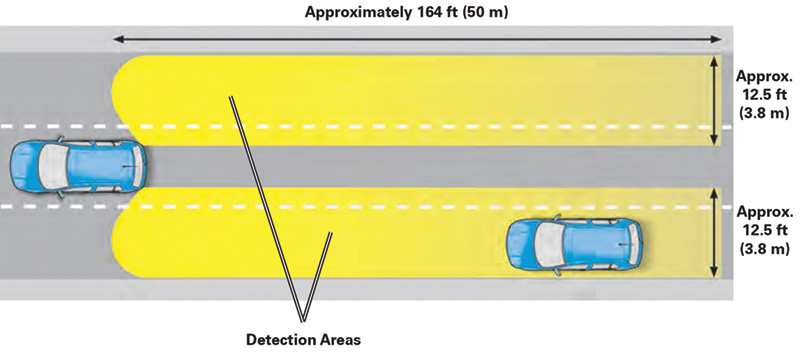
Rear Radar Sensors
Some vehicles have Blind Spot Monitor and Rear Traffic Alert. These systems have two radar sensors behind the rear bumper that scan traffic behind the vehicle.
The area monitored (on each side of the vehicle) includes the side and rear. The side area extends from the rear corner of the vehicle to about the level of the B-pillar.
For vehicles equipped with Rear Traffic Alert, radar sensors can measure the distance and the speed difference between the vehicle and an approaching object and use this to calculate the time until a possible collision (“Time to Collisionâ€).
Technical Radar Data and System Limitations
- Detection angle of the radar sensors is approximately 110 degrees
- Detection area is approximately 65 ft. (20 m) range
- Speed range for own vehicle from 1-7.5 mph (1-12 km/h)
- Speed range for the detected vehicle > 2.5 mph (4 km/h)
- Reverse gear must be engaged
Warning Sounds
- An acoustic warning from the dash panel insert, if Park Distance Control is not installed
- Beeping noise, if Park Distance Control is installed
- Automatic braking does not occur if the brake pedal is being pressed
6-Channel Ultrasound Sensors
For vehicles with Park Assist, two 6-channel ultrasound systems are used to monitor close range objects. This allows for assisted parallel and perpendicular parking.
Special Tools and Related Repairs
The number of vehicle equipped with Driver Assistance features is on the rise. With this rise, a shift in repair processes comes right along with it. A repair that was once a quick and easy job now may require radar or camera calibration. If an earlier Volkswagen was put into service position (alternate language here perhaps?), proper bumper cover alignment was for cosmetics. Now forward radar sensors must be realigned in addition to the bumper alignment.
Calibration of the forward radar sensor is required if any of the following occur:
- Rear axle toe setting has been adjusted (thrust angle)
- The Distance Regulation Control Module J428 has been removed and reinstalled
- The front bumper support has been removed and installed
- The front bumper support has become loose or has been moved
- The misalignment angle is greater than –0.8° to +0.8° (see below)
- The vehicle has been brought into the service position
- When performing an alignment
There are also some special tools required to service Driver Assist systems.
- VAS 6262 – Hunter Alignment Machine
- VAS 6430/3 – Basic set for calibration of VW vehicles with the ACC laser unit
- VAS 6190/2 – ACC Adjuster
- T10113 or T20 Driver
- VAS 6430/4 – Calibration Board For Lane Guard System
- HUN2018351 – Radar alignment kid
- VAS Scan Tool W/ODIS Service
- VAS 6350/4 – Calibration Tool – Lane Change Calibration Tool
- VAS 6350/2 – Calibration Tool – Spacing Laser
- VAS 6350 – Reversing Camera Calibration Tool
- VAS 6350/6 – Peripheral Camera Calibration Device
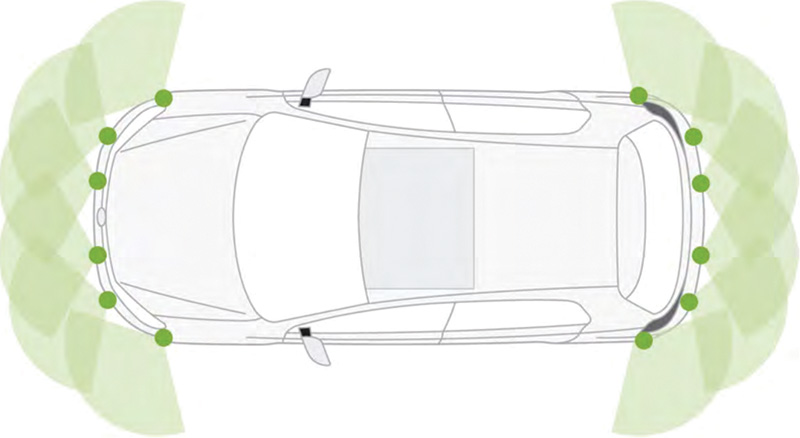

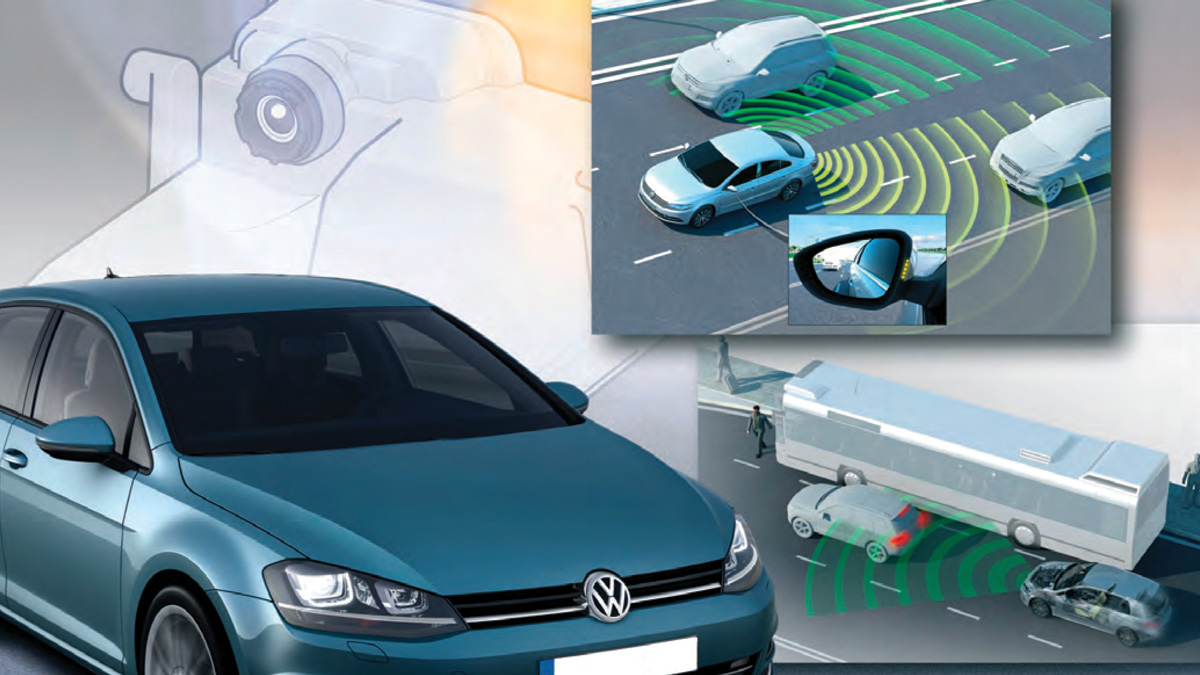
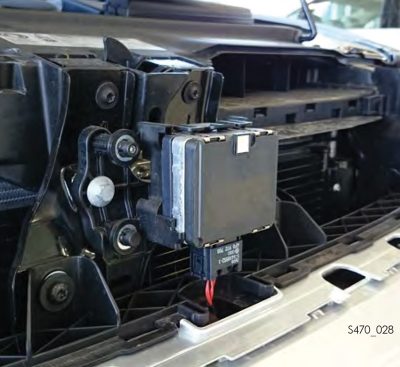

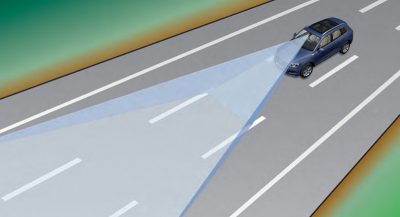
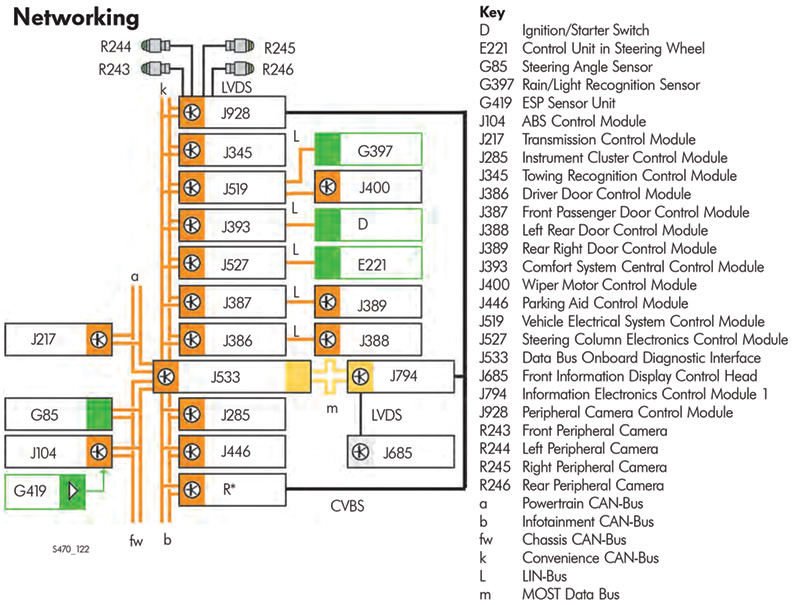
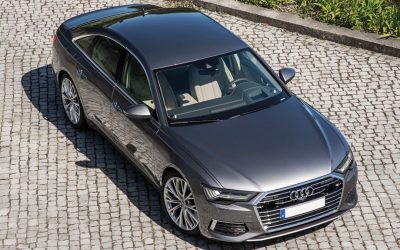
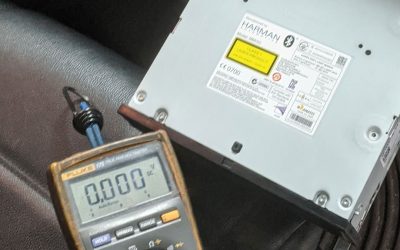
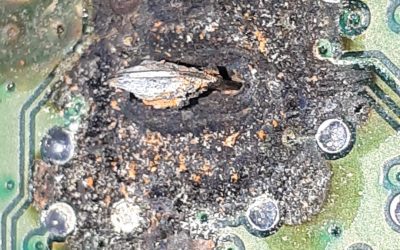
0 Comments